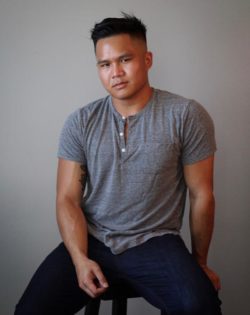
What’s Left: Queer Grief in the Everyday
Contributor’s Marginalia: Eric Tran on “Wind on Market Street” by Christopher Hewitt
I’m not a particularly religious person, but Zach Doss was one of the most miraculous things to come into my life. We met while I was in medical school and he was finishing his MFA in fiction. Soon, we talked every day about queer politics, writing, even small, superficial things. (One text that greeted me in the morning: URGENT Adam Rippon in a harness at the Oscars.) I’d never felt so not alone.
Weeks before I was set to graduate and start my residency in Western North Carolina, just shy of my 30th birthday, I received a message from Zach’s roommate—he died.
It was like a summer storm, a sudden heaviness in the air and then a pouring down. And then, somehow, over before the sun sets: I still graduated, still moved to a new city, where I did not and could not introduce myself as what’s left of Eric.
I didn’t tell anyone in my new life about Zach: not my roommates, not my fellow residents, not the few friends I had capacity to make. I didn’t tell anyone when another gay male friend died a month later. Or the one after him, or the one after him.
My new colleagues and friends were well-meaning, good-hearted people, but also cisgender and straight. I didn’t trust them to understand the queer phenotype of grief, how in textbooks I read about the AIDS crisis or how on the news I read statistics about the murders of black transwomen. How I am left dumb imagining all my loved ones disappearing—that young queer death is tragic, yes, but also inevitable. For as much as grief consumed my life, there was no room for it either.
*
The next year, I spent most days in my room, door closed, even when my roommates weren’t home. My excuse was that I was finishing my book and needed solitude to invest in poetry. And truly I did write a little and read quite a bit. But it was less in service of my own book than it was to create my own queer world within those four walls. I returned again and again to writers like Sam Sax, who writes “& just like that the first boy I ever kissed is dead” (“Kaddish”). I was captured by how he marries queer grief to queer desire: “I reach into space / trace the ghost waistband / hear / his voice gasp out from the dark.”
Danez Smith is another poet whose work helped build a queer sanctuary where they wrote to me, “He was a beautiful boy, the one who stole me” (“Healing: Attempt 3”). They, like Sax, underscore the delicate miracle of queer life: “He was my type: strong, black, alive.”
Other poets who kept my company united queerness—all its desires and dangers—with the mundanity of everyday life. In “Because It’s Summer,” Ocean Vuong writes of meeting a lover: “you ride your bike to the park bruised / with 9PM the maples draped with plastic bags / shredded from days the cornfield / freshly razed.” He allows queerness to exist even in a pastoral landscape. Eduardo C. Corral portrays queerness in America’s everyday racist and classist landscape: “To prevent shoplifting my boss / had me follow the Mexicans & the Native Americans who came in to shop. / I was slightly troubled by this. So I only followed handsome men” (“Ditat Deus”).
It was these moments of queerness in the everyday that both haunted and comforted me the most. I could imagine spaces outside of my room where I might be free to mourn and love Zach and my other late queer friends.
And reading Christopher Hewitt’s “Wind on Market Street” in 32 Poems 17.1 reminds me of the possibility of queer life—and therefore queer death, queer love and sexuality and grief—in the everyday. The poem opens unassumingly, where “trolley wires seam the sky a crow / parabolas; newsprint flits, folds / falls.”
But soon, the wind finds the queerness embedded of the everyday. It runs into a dapper dandy, “and his bowtie lifts / one green-on-copper paisley wing.” And later, through the wind’s encouragement, “a rainbow flag / ripples as if it were / the sea from which the wind of Market blew.”
In the past year, the more I believed the everyday world could sustain queer life, that queerness could thrive in all spaces, the less alone I felt. I eventually left my room. My grief followed me and it was welcome. Jacques J. Rancourt writes beautifully in “At the Place of the Bathhouses” about “A nondescript building with a nondescript name/ …a man who lived on the other side of catastrophe / tells me he worries over everyone / he fucked.”
I write of these poems because they facilitate space for queer grief, but in doing so, they also create space for queer joy—because of course a full queer life holds both. Hewitt’s poem ends by capturing such tension. The wind meets a “vaporous purple wig, / billowing over a box fan” in a storefront. After we watch it struggle between the wind and its display, it gloriously gives in and “slips from one last clothespin’s grip / and soars into the rafters.” In reading Hewitt, I remember the tradition of queer poets and remember that I am not alone. I leave confined spaces. Here I go.
